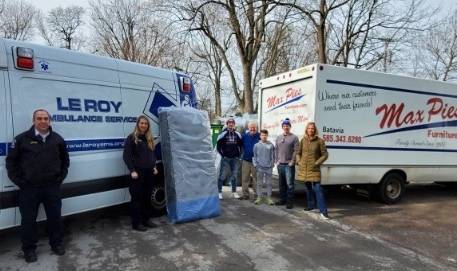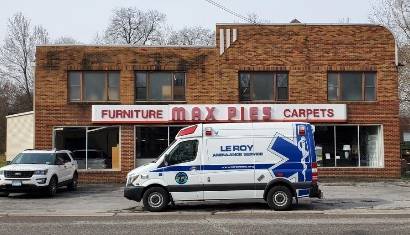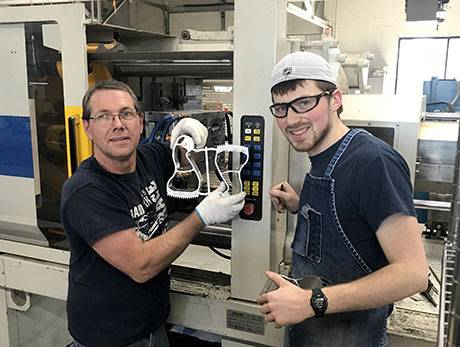Press release:
U.S. Senator Charles E. Schumer today (April 6) called on U.S. Department of Agriculture (USDA) Secretary Sonny Purdue to immediately release funding and send aid directly to New York’s struggling farmers.
Schumer negotiated $9.5 billion in emergency funding for the agricultural sector already suffering massive financial losses due to reduced demand and supply chain disruptions. The funding was part of the bipartisan $2 trillion CARES Act.
With more than 33,000 farms in New York State, Schumer explained that with restaurants, schools, and other industries closing nationwide due to coronavirus (COVID-19) concerns, New York farmers are losing major revenue streams.
Given the disruptions in supply chains, rampant food insecurity, and the importance of New York agricultural products in the U.S. food supply, the USDA must expedite the allocation of the $9.5 billion emergency agriculture aid set aside in the CARES Act and prioritize New York farmers, Schumer said.
Farmers Forced to Discard Food, Dump Milk
“New York’s farmers and the New York agricultural industry is the lifeblood of the nation,” Schumer said. “In good times, New York farmers work long hours on tight margins but in the midst of a global pandemic, they are losing revenue streams, suffering huge financial losses and being forced to discard their products during a time when we need a reliable food supply.
"I fought to make $9.5 billion accessible to help them out during this crisis, and it is imperative that we immediately put those dollars to use. I will not rest until New York farmers have the resources they need to help Americans get food on the table.”
In addition to demanding immediate help for struggling New York farmers, Schumer called for the USDA to take New York dairy producers, specialty crop farmers, and local and organic farms into consideration as among the hardest hit in the nation.
The Senator revealed that some dairy co-ops are directing farmers to dump their milk, indicating a huge loss in revenue for New York agriculture as milk is New York’s #1 agricultural product. Some farmers dumped more than 100,000 pounds of milk last week, and it is estimated that dairy farmers statewide were forced to dump between 25 million and 35 million pounds.
With prices plummeting and processing plants closing, dairy farmers could lose anywhere between $1 million and $1.2 million in the aftermath of COVID-19. Additionally, several cabbage growers have been unable to sell their produce for two weeks and are watching their entire harvest go to waste as their crops in cold storage reach the end of their freshness.
Small, Local & Organic Farms Are Hit Hard
Schumer also emphasized that local farms would be severely impacted by the crisis. Many small, local, and organic farms depend on farmers markets as an avenue to sell their produce, but as states issue stay-at-home orders and some local governments suspend farmers markets altogether, those small farmers are losing a major revenue streams.
They also are unable to generate revenue through visitor business and experiencing losses both financially and marketing-wise with the cancellation of food-related festivals that often happen in the spring.
Nurseries are also struggling to survive in the midst of the crisis because they are designated as nonessential businesses, while their large-corporation hardware store competitors are allowed to remain open. Schumer urged the USDA to support small business nurseries as they struggle to get through the crisis.
Senator Schumer’s letter to USDA Secretary Sonny Purdue.
Dear Secretary Perdue
"As you know, the agricultural sector has been hit hard by the COVID-19 outbreak and will continue to face grave challenges in the coming months. Unfortunately, farmers in my home state of New York are not immune to the ramifications of this global pandemic. New York farmers are experiencing massive economic losses due to reduced demand from restaurants, disruptions in global trade, school closures, and emergency orders that have idled other industries. Farmers are essential businesses who need our support to continue growing food during this crisis; otherwise, we risk our food security long after the pandemic has passed.
"I urge you to act immediately to allocate the $9.5 billion emergency funding provided in the CARES Act I fought hard to obtain to support the agricultural sector and the over 33,000 farms in New York State. Time is short, as the planting season is underway in much of the country. As you decide how this assistance will flow, please give careful consideration to the circumstances of New York State, which has been hit the hardest by COVID-19. My state has a very diverse agricultural industry, populated mostly by small and medium-sized family operations who depend on robust consumer demand in the New York City metropolitan area and thriving international trade for their markets. I have heard many concerns from struggling New York farmers over the past several weeks, and urge you to pay special attention to the following issues:
Dairy Industry
"New York’s dairy industry has been heavily impacted by drastic reductions in school meals, decreased demand from restaurants, and the slowdown in global trade. Prices for milk have sharply declined, making it difficult if not impossible for dairy farms to break even. Both large and small co-ops have been directing farmers to dump milk to balance supply/demand volatility and workforce shortages at processors due to COVID-19 illnesses among employees. At a time when millions of Americans are food insecure we must do everything we can to help our nations dairy farmers get through these turbulent times.
"I urge the federal government to use all available resources to assist the dairy industry during this unprecedented crisis. At a minimum, USDA should immediately use the $9.5 billion emergency fund included in the CARES Act to assist dairy farmers and co-ops through this health crisis and economic downturn by developing a compensatory mechanism to farmers directed to dump milk. In addition, I urge USDA to use funds from the Commodity Credit Corporation to make dairy purchases, perhaps through a voucher system for food banks or COVID-19 displaced workers, to help ensure that people who are experiencing food insecurity and hunger have access to healthful dairy products at their time of greatest need.
"I have also heard concerns from my sheep and goat dairy farmers, who are also experiencing the devastating impacts of the outbreak. I ask USDA to include sheep and dairy goat farmers in any assistance programs you develop.
Specialty Crops
"Farmers who grow specialty crops are also facing devastating hardships. The many New York farmers who sell directly to restaurants have experienced significant decreases in sales over the past month. As demand from restaurants dries up and crops in cold storage reach the end of their freshness, farmers will likely have to have to dispose of their crops, leading to an increase in food waste.
"As an example, cabbage farmers in New York are some of the specialty crop growers who are dealing with the crippling impacts of the outbreak. Several growers in my state have not been able to sell any cabbage at all for the past two weeks. These farms are anticipating millions of dollars in losses for their cabbage harvests and I expect to see similar losses for other specialty crops.
Local Farms and Organic Crops
"Many small, local, and organic farms generate a portion of their income by operating “you-pick” operations, welcoming members of the public onto their farms and allowing them to pick fruits and vegetables for a fee. Under the stay-at-home guidelines, farms are anticipating losing the revenue generated by farm visitors. Similarly, maple producers are experiencing immense losses from the cancellation of events like the NYS Maple Weekend and stay-at-home guidelines that have essentially closed down tourism in the Adirondacks and other maple-producing regions of the state. Aid must take into account the diversity of farm businesses and ensure that farms experiencing losses from direct marketing operations are also eligible for USDA disaster assistance, similar to relief provided to row crop farmers in the past.
Farmers Markets
"Many New York growers depend on farmers markets for a large portion of their income. As states issue stay-at-home orders and implement social distancing guidance, farmers markets have experienced a decrease in visitors and sales. Some local governments have even suspended farmers markets entirely, depriving farmers of a critical revenue stream. This decrease in income is having a devastating impact on small farms and local farmers markets. Again, USDA assistance should ensure that all farms, including diversified, direct marketing operations, have an ability to benefit from COVID-19 relief measures to ensure their financial viability after this current crisis.
Green Industry
"As states close all but essential businesses, nurseries are struggling to survive. Though horticulture and ornamental crops are an important agricultural sector, they are not considered essential because they do not produce food. Classified as nonessential businesses, many nurseries have been forced to close during public health emergency. Meanwhile, their Big Box competitors, often classified as hardware stores – an essential business – remain open. Nursery operations are also experiencing substantial hardship from widespread cancellation of events, weddings, and religious ceremonies. They grew their inventory in anticipation of seasonal demand and now have no market for their products. Please consider ways that USDA can ensure nurseries get the support they need during this crisis.
"Thank you for considering the impacts to New York’s agricultural sector and for doing everything you can to make sure the farmers, dairy producers, and processors we depend on are protected to the greatest extent possible."




